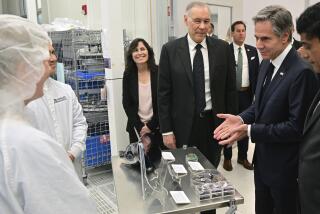Sony Taps Silicon Valley for Share of HDTV Research
- Share via
WASHINGTON — In a fresh sign that the race to develop the next generation of television technology for the U.S. market is speeding up, Sony Corp. announced Thursday that it will focus much of its research on high-definition TV at a major Silicon Valley facility in San Jose.
The announcement, which was made in New York by a host of top Sony officials from Deputy President Masaaki Morita on down, is aimed partly at defusing fears in Washington that American industry will be left out of what is expected to be the next huge market in consumer electronics.
“Today, HDTV is being held hostage as a symbol of the need for improving American competitiveness. This is most unfortunate,” said Neil Vander Dussen, president of Sony Corp. of America. Pointing out that Sony, which is headquartered in Tokyo, has located a major part of its engineering and manufacturing in the United States, Vander Dussen said that Sony “now significantly contributes to the strengthening of American competitiveness.”
Vander Dussen cited a recent report by the Berkeley Roundtable on the International Economy, a respected “think tank” at the University of California, that argued: “Domestic firms can adopt production, investment, location and sourcing strategies that weaken national competitiveness, while foreign-owned firms operating in the U.S. can adopt comparable general strategies that actually strengthen the competitiveness of the U.S.”
Unlike most major Japanese corporations, which until recently had kept nearly all of their manufacturing and advanced research at home, Sony has long followed a multilateral strategy of locating factories and other important facilities abroad.
“Sony’s approach to technology development is global,” said Morita, who is also chairman of Sony Corp. of America.
HDTV promises to bring a much higher quality of picture and sound to home television and is expected to be a $50-billion market by the end of the century. It is also expected to help spur major advances in imaging and other technologies useful in a wide range of electronics applications.
Congressional Urging
Several members of Congress, such as Rep. Edward J. Markey (D-Mass.) and California Rep. Mel Levine (D-Santa Monica), have been urging the Bush Administration to back a government-supported consortium of U.S. firms to bring American companies back into the consumer electronics industry. With the exception of Zenith, there are no U.S.-owned manufacturers of televisions or video recorders.
But Sony’s move, on the heels of a demonstration last week by the Sarnoff Research Center in Princeton, N.J., of a HDTV operation compatible with existing U.S. television sets, demonstrates how difficult it is today to separate what is an American versus a foreign firm.
One major newspaper, for example, recently billed the Sarnoff demonstration as evidence that U.S. firms could be major players in HDTV. But it failed to point out that nearly all of the support for the Sarnoff center comes from Thomson, the European electronics giant that recently bought RCA’s former TV operations from General Electric Co.
“In consumer electronics, there’s no way you can talk about re-creating a viable U.S. industry without help from foreign suppliers,” argued Michael Borrus, a Berkeley Roundtable researcher. “Those who think you can are pursuing a pipe dream that could do more harm than good.”
Sony, which is competing with a number of Japanese, U.S. and European firms in developing HDTV products, said that its San Jose facility would double in size from the 25 engineers currently working on HDTV projects. It also billed the move as a first step toward manufacturing HDTV equipment in the United States.
Sony, which has been shifting its overall emphasis away from low-profit consumer markets to more professional applications, so far has concentrated its work on developing production equipment for HDTV rather than television receivers.






